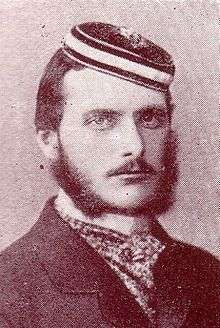August von Dönhoff
August Karl Graf von Dönhoff-Friedrichstein (26 January 1845 – 9 September 1920) was a Prussian nobleman and politician.
August von Dönhoff | |
|---|---|
 Count Dönhoff as Bonner Preuße | |
| Born | January 26, 1845 |
| Died | November 9, 1920 (aged 75) |
| Nationality | German |
| Occupation | Politician |
Life
Born in Frankfurt Dönhoff descended from the East Prussian branch of the Dönhoff. His father was the diplomat and Prussian foreign minister August Heinrich Hermann von Dönhoff, his mother Pauline, née Countess von Lehndorff. Dönhoff grew up on the family castle Friedrichstein not far from Königsberg and attended the Kneiphof Gymnasium. After the Abitur he studied law at the Rheinische Friedrich-Wilhelms-Universität Bonn. In 1865 he became a member of the Corps Borussia Bonn.[1] As a Prussian major he took part in the Austro-Prussian War at the age of 21. From 1868 to 1870 he was an articled clerk at the Kammergericht and then served again as a major in the Franco-Prussian War. Like his father, Dönhoff also embarked on a diplomatic career and worked as secretary of legation for the Empire in Paris, Vienna, London, Saint Petersburg and Washington. In Washington he made friends with the Interior Minister Carl Schurz and accompanied him on an adventurous journey to the American West. Dönhoff laid down his diplomatic duties when, after his father's death in 1874, he took over his hereditary seat in the Prussian House of Lords. At the 1881 German federal election he moved as representative of the German Conservative Party into the Reichstag (German Empire). He was elected in the Reichstagswahllkreis Regierungsbezirk Königsberg 4.[2] He belonged to this group until 1903, representing the interests of the East Elbian nobility and large estates. In 1906 he became a Prussian landowner. In 1917 August von Dönhoff was one of the founding members of the German Fatherland Party, which advocated a perseverance policy and a peace of victory in the First World War. Dönhoff died at the age of 75 at the Schloss Friedrichstein (Ostpreußen).
Family
In 1896 Dönhoff married in Karwitz the 24 years younger Maria von Lepel (1869-1940), with whom he had eight children:
- William (d. 1897)
- Christa (1898-1924), married 1922 to Bruno Freiherr von Dellingshausen
- Heinrich Botho Eugen von Dönhoff (1899-1942), married 1938 with Dorothea Gräfin von Hatzfeldt-Wildenburg
- Yvonne Franziska Ilda (1901-1991), married in 1919 to Alexander von Kuenheim
- Dietrich Wilfried Georg Karl (1902-1991), married in 1933 to Karin ("Sissi") Countess von Lehndorff
- Christoph August Bernhard (1906-1992), married 1931 to Vera Burkart
- Maria Elisabeth Helene Freda (1908-1965), born with the Down syndrome, died in the Bethel Foundation
- Marion Dönhoff (1909-2002)
Further reading
- Kilian Heck, Christian Thielemann (edit.): Friedrichstein. Das Schloß der Grafen von Dönhoff in Ostpreußen. Deutscher Kunstverlag, München/ Berlin 2006, ISBN 3-422-06593-8.
- Marion Gräfin Dönhoff: Namen, die keiner mehr nennt. Rowohlt, Reinbek 2009, ISBN 978-3-499-62477-3.
- Eckhard Hansen, Florian Tennstedt (edit.) among others: Biographisches Lexikon zur Geschichte der deutschen Sozialpolitik 1871 bis 1945. Volume 1: Sozialpolitiker im Deutschen Kaiserreich 1871 bis 1918. Kassel University Press, Kassel 2010, ISBN 978-3-86219-038-6, p. 34 (Online, PDF; 2,2 MB).
References
- Kösener Corpslisten 1930, 11/523
- Fritz Specht, Paul Schwabe: Die Reichstagswahlen von 1867 bis 1903. Eine Statistik der Reichstagswahlen nebst den Programmen der Parteien und einem Verzeichnis der gewählten Abgeordneten. Second edition. Verlag Carl Heymann, Berlin 1904, p. 3.
External links
- Information about August von Dönhoff in the Reichstag database
- August Graf-Comte Doehnhoff biography in Heinrich Best, Datenbank der Abgeordneten der Reichstage des Kaiserreichs 1867/71 bis 1918 (Biorab – Kaiserreich)